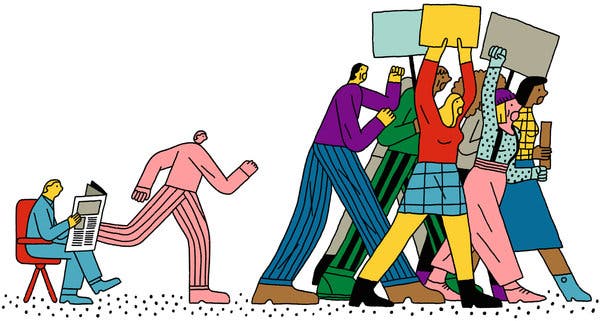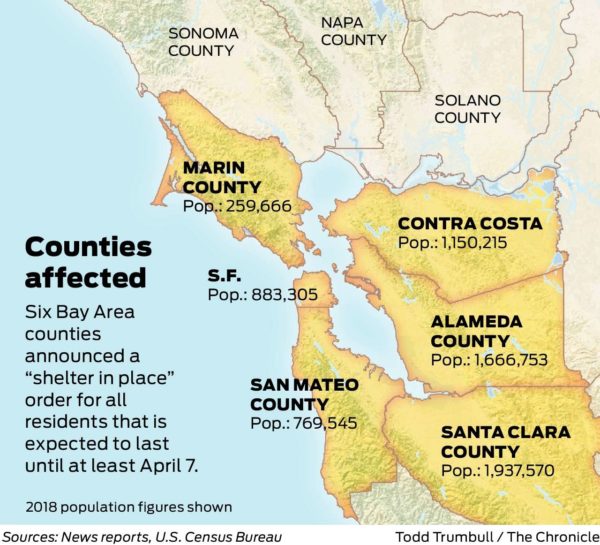Advertisement
Politics is about getting power to enact an agenda. And the only way to do that is face-to-face organizing.
By Eitan D. Hersh
Mr. Hersh is the author of “Politics Is for Power.”

In religion and in politics, participants come together in communities to serve a higher purpose. They worship together to serve God. They join advocacy groups and political party committees to serve their civic duty.
But increasingly, especially among well-educated white liberals, religion and politics are not face-to-face communal experiences. Instead, participants try to extract emotional and intellectual gratifications for themselves without obligating themselves to others. “Spiritual but not religious” identifiers, who now constitute a quarter of the United States population, are disproportionately made up of well-educated liberals. They seek spiritual self-care through technology, exercise and nature rather than through weekly attendance in a religious community.
The political equivalent are the news bingers, online debaters and kitchen-table exasperators who are emotionally invested but do not participate in organized political life. I call them political hobbyists. They are most prevalent among the same cohort of educated white liberals as the spiritual-but-not-religious. In a 2018 survey, for instance, I found that college-educated whites reported spending much more time on political consumption than did blacks and Hispanics, but significantly less time volunteering in political organizations.
Why have so many embraced these individualized forms of religion and politics? A key part of the story is that educated whites are comfortable enough with the status quo that they don’t feel the need for face-to-face political and religious communities. They see more aggravation than upside in supporting such communities.
But here’s something they should understand: They might be able to satisfy their spiritual needs without organized religion, but there is no path to achieving their political goals without organized politics.
In 2016, a record number of people said they were very interested in the presidential election — 49 percent, according to the National Election Study, more than any year since the question was first asked in 1952. But when it came to actually working for a campaign or party, or attending meetings or rallies, 2016 was unremarkable in the survey; the number who reported working for a campaign was just below the historical average.
In 2018, I asked for details about how Americans were spending their time on politics. A third of survey respondents reported spending two hours a day consuming news and thinking and talking about politics. Of those, very few spent more than a trivial amount of time working in organizations. Of course, activism, particularly on the left, has surged since 2016. Some Americans are dedicating countless volunteer hours. They just have a lot less company than you might think.
The power of community, religious or political, comes in large part from mutual dependence, which requires giving attention to people besides yourself. The Rev. Lillian Daniel of the First Congregational Church in Dubuque, Iowa, put it this way: “Community is where the religious rubber meets the road. People challenge us, ask hard questions, disagree, need things from us, require our forgiveness. It’s where we get to practice all the things we preach.” Some find that arduous.
Community also requires empowering local leaders who can guide participants on a mission. Some find that scary, and for good reason. In both politics and religion, leaders have, from time to time, taken advantage of their communities’ trust. One explanation for the significant growth of the religiously unaffiliated is people witnessing abuse and exclusion in the Roman Catholic Church and elsewhere, and saying: I’m done with that. In politics, local party bosses have been corrupt. Local party committees have been bastions of racial discrimination. Historically, many people, particularly middle-class, reform-minded Americans, have thus viewed party organizations with suspicion, if not contempt. They love the idea of politics but wouldn’t want to dirty their hands doing it.
Some people do accept the burdens of mutual dependence and the risks of local leadership because they have needs, desires and fears that community helps them address; others choose to stay home, out of the fray. The spiritual-but-not religious identifier and the political hobbyist share a mentality that is deliberately powerless, rejecting community to avoid the hassle and to avoid getting burned.
At times, religious and political hobbyists can feel connected to community even when they aren’t pitching in to one: perhaps finding a spiritual connection in the charm of the twinkling lights of December or a sense of solidarity in an uplifting moment for their political allies. But in the gloom of late January, when the holiday parties are over, and in the darkness of political defeat — when their preferred presidential candidate is no longer in the running or the impeachment trial isn’t going how they dreamed it would — the now-melancholy religious and political hobbyists lack any communal routine to motivate them.
The regular churchgoers still have their community, and the active local political organizations have their regular meetings. Churchgoing Republicans, for instance, can still leverage the power of community even when their leader is flawed or they feel down. Many on the religious right are pained by President Trump’s behavior but believe him to be the best available vehicle for their political goals. So they persist.
The increasingly nonreligious Democratic Party may continue to stay away from religious communities, even though research has found that religious participation, no matter the orthodoxy of beliefs, corresponds to greater involvement in civic and charitable work, and to higher degrees of happiness, and it also generates the social capital that can be leveraged for political activism.
But if liberals also shy away from face-to-face political communities, choosing to spend their free hours as at-home hobbyists rather than participating in weekly political meetings and canvasses, they should expect to reap as little as they sow. Politics is about getting power to enact an agenda. It’s about working in groups to turn one vote into more than one vote, one voice into more than one voice, by getting others on board with you. If you aren’t doing that, you aren’t doing politics. But hey, congratulations on your interesting hobby.
Across the country, I have studied local political organizations on the left and in the center where neighbors take care of one another just as they would in a congregation, and through this mutual aid and support, they find strength to accomplish not just psychic and social goals but political goals, too. But to unseat an incumbent president or to make progress on policies they care about, a lot more people will have to abandon the mind-set of leaderless and powerless hobbyism. Without buying into real communities and putting faith in local leaders, there can be no redemption.
Eitan D. Hersh, an associate professor at Tufts University, is the author of “Politics Is for Power.”
The Times is committed to publishing a diversity of letters to the editor. We’d like to hear what you think about this or any of our articles. Here are some tips. And here’s our email: letters@nytimes.com.
Follow The New York Times Opinion section on Facebook, Twitter (@NYTopinion) and Instagram.


